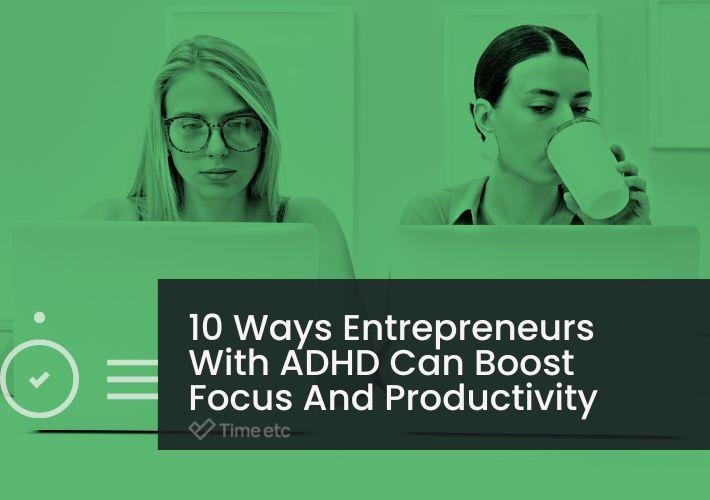ADHD and entrepreneurship often go hand-in-hand, with a growing body of research suggesting that people with ADHD could be some of the world’s most natural entrepreneurs. But of course, success is down to more than just the brain you’re born with. Success is the product of making full use of your time to effectively leverage your strengths and focus on high-quality, high-impact work.
But putting this into practice can be difficult at the best of times, not to mention when your brain throws a few extra curveballs at you that can make it even harder to focus, complete tasks, and manage your time.
If you’re an entrepreneur with ADHD, it may feel like you are constantly fighting an uphill battle. But the good news is, there are plenty of strategies you try that can help make your days run a little smoother.
For these tips, I’ve been working closely with Isabel, our Content Coordinator here at Time etc, who was diagnosed with ADHD in 2021. Together, we want to share the techniques that have helped us both to navigate certain obstacles and achieve more.
Focusing and staying on task
As a business owner, there always seem to be a million things competing for your attention at any given moment, pulling you away from what you should be doing. Staying focused can be tough at the best of times, and an even greater challenge for people with ADHD.
According to research, this is due to lower levels of dopamine and norepinephrine — neurotransmitters in the brain associated with attention and focus.
So when it’s not for a lack of trying or good intentions, how can we keep ourselves on track?
1. Lists, lists, and more lists!
In his book “The ADHD Advantage: What You Thought Was a Diagnosis May Be Your Greatest Strength”, Dr. Dale Archer uses the term “bingo brain” to describe the thought patterns experienced by some people with ADHD, “Have you ever noticed how the balls in a bingo machine jumble around together before coming up with a number sequence? The balls ricochet off one another and the sides of the cage, popping up out of nowhere and making seemingly random connections in rapid fire.”
Writing a list helps to declutter your mind and cut through the noise of all your competing thoughts. You might have a general list of things to complete – at work and/or home – but it’s worth having a dedicated list of your priorities each day that you can easily refer to whenever you need a nudge.
2. One task at a time
Constantly switching back and forth between tasks, or starting new ones before finishing outstanding ones, are among the top reasons why we lose productivity each day. The amount of time we spend trying to remember where we left off each time with the previous task can seriously add up. Not only that, but having too many plates spinning at once can be overwhelming, and mistakes are more likely to be made when our attention is scattered.
When you’re working through your to-do list, highlight the top task in a different color so your eye is immediately drawn to it. When you’ve completed that task, highlight the next one. This way, you always know instantly what it is you should be working on at a glance.
3. “Dump” those distracting thoughts
The biggest enemy of focus is, of course, distractions. With so many thoughts and ideas continually popping up in our “bingo brains”, coupled with our impulsive tendencies, we’re much more susceptible to being derailed.
Rather than completely ignore those thoughts (which is often much easier said than done!), create a designated area for them that you can return to later. Some people like to perform a “brain dump” each morning and offload all their distracting thoughts before starting their day, while others prefer to note them down as and when they pop up. Either way, you’re far less likely to get sidetracked, and or lose any spontaneous lightbulb moments.
4. Create a set-up for success
Having the right tools, workspace, and surroundings can make all the difference in enhancing your focus. If there are any little niggles that your mind can latch on to, it most likely will! For example, mess or clutter (“I should clean that up”), noise levels (“It’s too loud/too quiet!”), and your chair and desk (“I’m uncomfortable”) can all become elephants in the room of your concentration.
I have an identical workspace at home and in the office so I’m always primed to do my best work, and I don't have to waste any time mentally adjusting to a different setup.
5. Body doubling
Simply put, doing a task in the presence of another person. In the same way that students often choose to study in the library with other quiet, focused individuals, chances are you’ll find it easier to get things done working alongside someone else who is working hard. You’re holding yourself accountable to that person and you don’t want to let them down by getting distracted or straying off-task. If nothing else, having some company may make an otherwise boring task more enjoyable!
Handling hyperfocus
A common, yet confusing and contradictory, trait of ADHD is hyperfocus, also known as hyperfixation. Defined as an intense fixation on an interest or activity for an extended period of time, people who experience hyperfocus can lose themselves so deeply in “the zone” that they completely block out the world around them.
According to ADHD expert Dr. Ned Hallowell, hyperfocus is more likely to occur when a task is challenging, you’re passionate about it, and you are able to progress. For many entrepreneurs, the ability to hyperfocus can play a major role in successfully growing their businesses. But it’s not something that can just be turned on and off like a light switch, and sometimes it is possible to have too much of a good thing. Here’s how you can harness it effectively.
6. Block out time
Just as there are two sides to the hyperfocus coin, there are two reasons why this is essential.
If, like us, you find hyperfocus strikes at certain times of the day more than others, that’s the best time to block out for periods of deep work on high-impact tasks. It’s why you’ll find me working on more creative, problem-solving tasks between 3-7 pm. Chances are, this is where you’ll do your most meaningful work – and to your highest standard – so it’s worth protecting these sessions as much as you can.
But without a firm endpoint, you can become so absorbed in what you’re doing that you run the very real risk of losing track of time, missing appointments or deadlines, and neglecting other needs and responsibilities. Use timers, alarms, or even colleagues or loved ones to stop you from getting stuck in a hyperfocus black hole.
Tackling procrastination
Procrastination is a problem that affects people from all walks of life, not just those with ADHD. It is, however, much more likely to impact their daily lives than those without. Experts believe that people with ADHD have a disruption in the dopamine pathways in their brains. In other words, a supply chain issue with the neurotransmitter associated with pleasure, reward, and motivation. This makes them "chemically wired" to always seek more, which is why starting a task that’s less appealing can feel like a physically painful prospect.
This can also affect their ability to plan and visualize the future. Recent research also suggests that this makes people with ADHD “hypersensitive to delay”, meaning that given the choice between an immediate reward or a future reward, the immediate reward will always win out. But when so many worthwhile endeavors are the result of long-term efforts – like fitness, weight loss, academic achievements, and financial goals – how can we stop procrastination from holding us back?
7. Play procrastination ping-pong
When you touch something hot, you don’t have to think about moving your hand away. In the same way, sometimes we don’t even realize we’re procrastinating until half an hour later. But procrastination didn’t occur slowly over those 30 minutes, it happens in a split second. So as a chronic procrastinator, I developed this technique of “procrastination ping-pong” to help reduce the impact of all those split-second moments that constantly threaten to derail me throughout the day.
Whenever I notice that moment occurring where I’m about to deviate from my current task, I immediately bring myself back to whatever I was working on – similar to returning a serve in a game of ping-pong. Simply being more aware of our actions in the present moment makes it much easier to catch ourselves when we start to procrastinate.
8. Bring the future forward
If your future goals feel out of reach and hard to connect with in the present, break them down into a series of smaller, short-term goals. Then, set one for yourself every day or week, with a firm deadline. When the feeling of satisfaction (and dopamine hit!) of achieving an immediate win is always close at hand, you’ll be less likely to put it off.
9. Dopamine rewards
For any task that you’d usually struggle to start, schedule something immediately afterward that does trigger that feel-good chemical. Whether that’s a coffee break, a walk outside, or listening to your favorite music, providing yourself with the “reward” that you wouldn’t have got otherwise is a highly effective way to ensure those tasks don’t get put off any further.
10. Delegate
This one may sound like cheating, but hear me out! On average, business owners only spend 32% of their time working on their business (strategic and revenue-generating activities that lead to increased profitability and growth). I’m sure that a major culprit behind these stats is that most of the work in our businesses – day-to-day tasks, ad-hoc requests, putting out fires – falls in the “immediate” category, and is more appealing to our dopamine-seeking brains. By offloading these less impactful tasks, you’ll have less to take you away from the work that takes you closer to your future goals.
If the opposite is true, and it’s those repetitive, daily – yet still necessary – tasks that you’ll find any excuse not to do, taking them off your plate and into the hands of an assistant will ensure that they never fall by the wayside.
What’s the bottom line?
In a world where creativity is king and innovation is key, it’s hardly surprising that so many entrepreneurs can relate to ADHD. “Those with ADHD are life’s entrepreneurs, CEOs, leaders, explorers, and out-of-the-box thinkers, with extraordinary abilities to work under pressure, rebound from crises, multitask and conceive of ideas outside the restrictions of linear thinking,” writes Dr. Dale Archer. “They are also an overwhelmingly positive bunch, possessing an innate resilience, high energy, and a sense of humor that allows them to get past the many challenges of day-to-day living, and to keep on trying.”
But even with so many qualities that can work in our favor, there’s no denying that it often comes at a cost.
While there’s no magic wand that we can wave that can make it all go away, there are plenty of strategies that can help make each day more manageable.
It can be difficult to let go of expectations, especially if they've been ingrained in you for a long time. However, it's important to remember that everyone works differently and what works for others may not work for you. Give yourself permission to find a system that works for you instead of forcing yourself into someone else's. This way, you'll be much more productive and, ultimately, successful.







